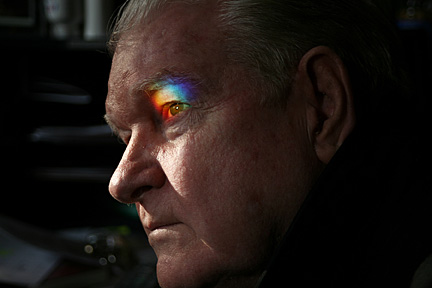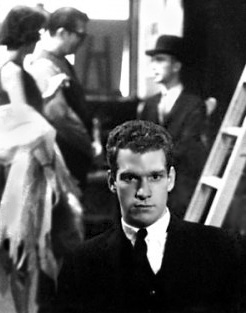|
Welcome to the Archive Version of the online On the Purple Circuit, which ran from 2000-2021. Bill Kaiser founded the Circuit as a newsletter in 1991, and, in 2000, Demian joined as co-editor. Demian programmed the site, expanded the scope of the Circuit, as well as retouched all the images. Demian needed to stop working on the Purple Circuit in order to realize his other projects, such as publishing the book “Operating Manual for Same-Sex Couples: Navigating the rules, rites & rights,” now available on Amazon, and to publishing his “Photo Stories by Demian” books based on his more than 6 decades as a photographer and writer. QueerWise and Michael Kearns have committed to offering a continuation of the Purple Circuit. The new Web address is purplecircuit.org. Bill Kaiser continues as editor and can be reached at purplecir@aol.com Bill and Demian express their appreciation for the hundreds of writers, directors, actors, and publicists who sent their articles and play data. They have toiled mightily to bring our gay, lesbian, trans, and feminist culture into public view, and appreciation. |
| Bill Kaiser, founder (1991), publisher, editor - purplecir@aol.com - 818-953-5096 Demian, associate editor (2000), Web builder, image retouch (since 2003) Contents © 2022, Purple Circuit, 921 N. Naomi St., Burbank, CA 91505 |
|
Doric Wilson February 24, 1939–May 7, 2011 by Demian © August 26, 2011, Demian |
Born Alan Doyle Wilson on February 24, 1939, in Los Angeles, California, where his family was temporarily located. Doric was the only child of Howard and Marjorie Doyle Wilson, and was raised on his grandfather’s ranch at Plymouth, Washington on the Columbia River. My Brief Experiences with Doric My experience of Doric was primarily from 2000-2007 via e-mail, as I attempted to do my job as Purple Circuit article recruiter and editor. I had spent months coaxing him to send us descriptions of his plays, then many more months receiving his wrath when I made editing suggestions to condense or make grammatical corrections to his text. Doric’s Writing These are Doric’s descriptions of some of his plays: What Doric’s Colleagues Thought of Him “If you look at Doric Wilson’s work of the last fifty years, you will see that he knows more words than most people and knows how to use them, but there’s one word that he’s never heard, and this is ‘compromise.’ Doric has always told it as it is. He has never believed in playing it safe and the word ‘sugar-coating’ is not in his vocabulary either. His theater is tough, funny and right on target. No pussyfooting for Doric: he doesn’t write gay theater; he writes queer theater.” “Doric Wilson’s plays are smart, sexy, outrageous and most importantly; tell the truth.” “Wilson has devoted his life to the once-radical notion that gay lives deserved true representation.” “I don’t know if Doric set out to inspire several generations of playwrights, but that has been his role. It is largely due to his model that the custom of Off-Off Broadway became for plays to be independent, audacious, individual, and uncompromising — four words that had rarely been applicable to plays before. Writers in many lands who did not know Doric existed or that he originated this stance took it as rote. His quiet revolution has been reverberatory.” “Doric Wilson is a brilliant playwright, a pioneer in queer theater, and a great guy — it’s just not fair. He deserves a celebration, a parade, and, if there’s any justice, West Street should be renamed Doric Wilson Boulevard. We are all in his debt.” “Doric Wilson specializes in stylish farce, ironic comedy of wit, and urbane satire … His combination of fantasy and whimsy and his intellectual dialectic suggests the touch of a Giraudoux or a Shaw … Yet underlying his often caustic comedy is surprisingly romantic sensibility.” “Doric Wilson first made history at the age of just 22, becoming the first playwright to have new work produced regularly at the now-legendary Caffe Cino, cradle of the 1960s Off-Off-Broadway movement. His witty, satirical plays — with their deft combination of mythic content with bluntly down-to-earth staging and characterization — made a virtue of the Cino’s physical and financial limitations, and established a model later imitated by countless others. Doric made history at 22, and has been trying (unsuccessfully) to live it down ever since.” “Doric Wilson was the first playwright produced by Joseph Cino to have a significant career in the professional theater. Wilson’s Street Theater and his A Perfect Relationship have become standards in the American gay theater canon, and Wilson’s own activism on the part of New York gay theater, led to his formation of TOSOS (The Other Side Of Silence) Theater, which is and was America’s first true, proud gay theatre. His play, And He Made A Her... set a model for all of the Cino language plays to follow, and until his falling out with Cino, Wilson was THE Cino playwright and a favorite of Albee’s producer Richard Barr, who at one point considered Doric Wilson to be the next Edward Albee. Doric Wilson’s work, articulate, ornamented, ironic, and biting, became a model for the work which followed. While the Irish may claim Oscar Wilde among their great dramatic poets, America claims Doric Wilson as our Oscar Wilde!” “A pioneer of the alternative theater movement.” “This trailblazer literally changed the trajectory of American Theatre.” “Doric taught me about gay theatre and off off Broadway theatre, without which knowledge I probably would never have had the career in the theatre that I had. He was my mentor, and I will always be indebted to him for that.” “Once upon a time, giants walked the earth, known as ‘Grand Men of the Theater.’ There are damned few of them around today, but Doric Wilson undoubtedly ranks as one, for his tireless, effervescent creativity and commitment to both the stage and gay communities. He is a living New York treasure.” “I admire Doric Wilson for his contributions as a theatre artist and as a social activist, which are immense. But I think I admire him most for his apparently endlessly questing soul and the extraordinary generosity that bursts forth from it every time I see or speak to him. His support of all the independent theater artists who have followed in his pioneering footsteps is inspiring. His welcoming spirit has created an ever-widening community full of talent and energy and amazing karma.” “Progress toward creating a true gay community and a secure place for that community in the world cannot be won only by political means: it must also be realized by the creation of works of art that reflect the realities of LGBT life. Doric Wilson has been an important pioneer in creating a theater that embraces the humanity of gay people and for this he deserves not only our gratitude but our respect, honor, and affection.” “The plays of Doric Wilson are wondrous portals into the heart, soul and mind of our times. They also reveal essential things about the artist himself: his devotion to social equality and justice, his legendary generosity to fellow artists, his deep reserves of historical recall, his appreciation of good jokes. If you love his plays you love the man whether you’ve been lucky enough to meet him or not. A Wilson play is deeply personal regardless of how fanciful or outrageous. It is extravagantly romantic while somehow feeling freshly modern. A Wilson play tells hard truths while eliciting gales of laughter; charms as it secretly radicalizes; incites a quiet audience to be noisy, a noisy audience to be quiet. It entertains, and that is why, beyond considerable historical importance, Doric Wilson’s name will hold a perennial place on theater marquees everywhere.” “Being Doric Wilson’s director of choice for that last 10 years has been a privilege and an education. Bringing his plays to life is a distinct and unequaled pleasure. I love watching audiences watch Doric’s plays. His words, wisdom and wickedness are as fresh and resonant today as when audiences first heard them (I imagine) because the response is always electric. In my book that qualifies them as ‘classics.’ I've learned more about making theater through working with him than with anyone I’ve ever known and for that I’ll always be grateful. Plus, he’s really funny!” “I can’t imagine Doric Wilson resting in peace. Whatever awaits him on the other side of that river that we all must cross someday, I have a feeling it will include unfinished scripts and unbridled humor, and maybe a few shots of brandy.” “Mr. Wilson was one of the first resident playwrights at the legendary Caffe Cino in Greenwich Village, where many fledgling Off-Off-Broadway playwrights cut their teeth. His comedy And He Made A Her opened there in 1961. Only two years in New York, and not wanting people to think the work was his first produced play, he attended performances in three-piece suits with a trench coat tossed over his shoulders. ‘I also drank brandy and soda,’ he recalled. “Doric was smart. His plays had a kind of classical elegance to them; they were tight in the middle of a lot of druggy mayhem (which we loved also, because when you’re young and living downtown on no money, druggy mayhem is a delight). Druggy mayhem is what takes over after 2am when you’re hanging around Avenue B, having left the old Club Baths, which is now Lucky Cheng’s, a pseudo Chinese club for tourists with drag-queen hostesses. But Doric, who was into leather and S & M way before Giorgio Armani put his money into it, injected rigor and heat into gay theatre. In plays like A Perfect Relationship and Now She Dances, he gave downtown theater an Oscar Wildean tension caught in a cock ring. He was smart, and not at all parochial, like a lot of downtown queer theatre artists were who did a lot of rib nudging because they were speaking directly to us, but no further. So Doric’s plays got done a lot, all over the place — on the West Coast, in Europe. He was always on the precipice of discovering something new — a new take off, a new dive into tomorrow. He was excited by that. He would tell me how disappointed he was looking in the mirror. Getting older was horrible, but that he was getting discovered every day by another generation of queer theatre gourmets, who wanted to eat the stuff just like we did. They wanted to live on it, they wanted to exist in it and not exist without it. He loved them. He was crazy about them: Doric — we’ll miss you, our sweet red-headed prince.” “Doric was a great man, and great men have great flaws. The man had a temper. And he had a mouth on him, as my mother would say. And he had very firm beliefs about what gay people could expect in the theater, and from society. He did not believe that a straight organization would fund a gay theater (though nobody crowed louder than he did when the Dramatists Guild Fund began to make grants to Chesley/Chambers). Doric Wilson’s Major Plays
Some of Doric Wilson’s Awards and Honors
Where to Get Doric Wilson’s Plays
Street Theater, Forever After, and A Perfect Relationship are published by:
Street Theater is also included in the Don Shewey edited anthology
And He Made a Her (includes CD of original 1961 Caffe Cino performance),
Demian
Demian was Web programmer, image retoucher, and copy editor for all Purple Circuit listings and articles from 2000-2022. |

